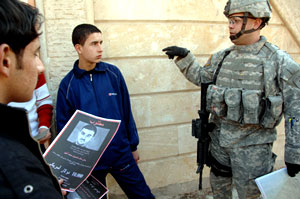- Bush Admin seeks permanent military bases in Iraq (FCN, 06-22-2007)
- Why is the military building ‘permanent’ bases? (FCNL)
- Graphical Overview of Iraq’s Oil fields and facilities (Image)
- Iraq: Permanent US Colony (Dahr Jamail, 03-14-2006)

UNITED NATIONS (FinalCall.com) – Activists and analysts are saying the Bush administration was up to its old shenanigans when it pushed the United Nations Security Council for a mid-December vote to renew of the mandate for the multi national force in Iraq.
They argue the move was another step toward a permanent U.S. presence in Iraq, which has been underreported, and example of the superpower’s use of the UN to pursue national interests.

The Security Council voted 15-0 to adopt Resolution 1790, which extends the mandate for U.S.-led occupying forces through Dec. 31, 2008. The resolution says the Security Council agrees to review the mandate at any time, if requested by Baghdad, or no later than June 15, 2008.
The original mandate that allowed U.S.-led troops into Iraq was established by the Security Council in Oct. 2003 and renewed in June 2004, Nov. 2005 and Nov. 2006.
Iraqi Prime Minister Nuri al-Maliki stated in a Dec. 7 letter to the Security Council that Baghdad “considers this to be its final request to the Security Council for the extension of the mandate.”
Zalmay Khalilzad, U.S. ambassador to the UN, told reporters after the vote, that the council saw the Iraqi government expressing continuned support for the multi-national force to help with security challenges. He welcomed speedy adoption of the resolution. “MNF continues to play a vital role in the security and stability of Iraq,” he said.
John Sawyers, his British counterpart, also hailed the vote and stressed British forces would continue to provide training, support and mentoring to the Iraqis despite their handover of the oil-rich province of Basra.
While Russia supported the resolution, Ambassador Vitaly Churkin told reporters there was a need “to signify the deadlines” by which the force will withdraw. The multi-national force “we must say is a serious irritant for many Iraqis,” he added.
Opinion polls have found Iraqis opposed to coalition forces in their country, with a majority saying the presence of U.S. forces only makes security worse.
According to press reports, a majority of Iraqi lawmakers contend the new mandate was made without authorization by Parliament and is “unconstitutional” and “unilateral.”
In a letter sent a week before the Dec 18 UN vote, Iraqi lawmakers said, “We reject in the strongest possible terms the unconditional renewal of the mandate and ask for clear mechanisms to obligate all foreign troops to completely withdraw from Iraq according to an announced timetable.”
James Paul, executive director of New York-based Global Policy Forum, a UN watchdog organization, said Iraq’s parliament wants a firm timetable for the withdrawal of the coalition forces now.
Mr. al-Maliki, in his letter, did not mention the need for a fixed timetable, but merely stated negotiations on a new pact to govern the U.S./UK forces would be held in 2008.
Iraqi lawmakers argue they have the final word on the just passed mandate renewal, citing Article 58, Section 4 of the Iraqi constitution, which says international treaties and agreements must be ratified by Council of Ministers, Iraq’s parliament, said Global Policy Forum.
A letter published on the Global Policy Forum website, and signed by 144 of the 275 lawmakers, warned the Security Council and Mr. al-Maliki not to approve the renewal for 2008 without parliamentary approval. That letter was posted in April, long before the vote in December.
Iraq’s prime minister has argued UN mandate doesn’t count as either a treaty or an agreement, and therefore didn’t require any approval from the legislative branch.
Mr. Paul, of Global Policy Forum, asked if either letter from the Iraqi parliament was ever brought to the attention of the Security Council. Farhan Haqq, a spokesman for the secretary-general explained to The Final Call, that the only letter distributed was from Mr. al-Maliki.
“This is an amazing political development,” Mr. Paul told The Final Call.
Many suspect Security Council delegates were under instructions from their governments to lay low and pass the U.S. resolution, he said.
“The UN cannot claim ignorance,” said Phyllis Bennis of the Institute of Policy Studies. “They know this is about the UN giving credibility to the occupation; and ultimately to permanent U.S. bases in Iraq.”
The UN also knows that Mr. al-Maliki would not survive without the U.S. troops, Ms. Bennis said.
Ms. Bennis pointed to concerns raised by Rep. William Delahunt, chairman of the U.S. House of Representatives’ Foreign Affairs Committee. The Massachusetts Democrat opened a Dec. 19 hearing by noting serious questions had been raised about whether the Iraqi executive branch followed the rule of law in its request for extension of the UN mandate.
Issam Saliba, senior Foreign Law Specialist for the Library of Congress, told Mr. Delahunt’s committee the Iraqi government is under a “constitutional obligation” to seek the Iraqi parliament’s approval for its request to extend the multi-national force mandate.
In an early December letter to Secretary of State Condoleezza Rice, three Democratic congresswomen from California–Rep. Barbara Lee, Rep. Lynn Woolsey and Rep. Maxine Waters–noted any renewal of the UN mandate should include a timetable for withdrawal. The letter asks for a commitment from the Bush administration that there will be no long term U.S. bases in Iraq. The congresswomen called attention to U.S. public support for an end to the occupation and noted its immense financial and human cost.
After the resolution vote, when a reporter asked Amb. Khalilzad whether the U.S. wanted to keep the door open to keep its troops in Iraq, the diplomat responded that the extension request came from the Iraqi government, “representing the will of the Iraqi people.”












